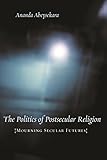The politics of postsecular religion : mourning secular futures / Ananda Abeysekara.
Material type: TextPublisher number: EB00662469 | Recorded BooksLanguage: English Series: InsurrectionsPublication details: New York : Columbia University Press, ©2008.Description: 1 online resource (xvi, 324 pages)Content type:
TextPublisher number: EB00662469 | Recorded BooksLanguage: English Series: InsurrectionsPublication details: New York : Columbia University Press, ©2008.Description: 1 online resource (xvi, 324 pages)Content type: - 9780231512671
- 0231512678
- 201.72 201/.72
- BL51 .A33 2008eb
- online - EBSCO
| Item type | Current library | Call number | URL | Status | Notes | Barcode | |
|---|---|---|---|---|---|---|---|
 eBook
eBook
|
Biblioteca "Angelicum" Pont. Univ. S.Tommaso d'Aquino Nuvola online | online - EBSCO (Browse shelf(Opens below)) | Online access | Not for loan (Accesso limitato) | Accesso per gli utenti autorizzati / Access for authorized users | (ebsco)515390 |
Browsing Biblioteca "Angelicum" Pont. Univ. S.Tommaso d'Aquino shelves, Shelving location: Nuvola online Close shelf browser (Hides shelf browser)
Includes bibliographical references (pages 279-310) and index.
Acknowledgments; 1. Thinking the Un-improvable, Thinking the Un-inheritable; 2. Aporias of Secularism; 3. Postcolonial Community or Democratic Responsibility?: A Problem of Inheritance; 4. Toward Mourning Political Sovereignty: A Politics ""Between a No-Longer and a Not-Yet""?; 5. Im-passable Limits of Fugitive Politics; 6. Active Forgetting of History, the ""Im-possibility"" of Justice; 7. Politics of ""Postsecular"" Ethics, Futures of Anti-genealogy: Community Without Community?; Notes; Index.
Ananda Abeysekara contends that democracy, along with its cherished secular norms, is founded on the idea of a promise deferred to the future. Rooted in democracy's messianic promise is the belief that religious & mdash;political identity-such as Buddhist, Hindu, Sinhalese, Christian, Muslim, or Tamil & mdash;can be critiqued, neutralized, improved, and changed, even while remaining inseparable from the genocide of the past. This facile belief, he argues, is precisely what distracts us from challenging the violence inherent in postcolonial political sovereignty. At the same time, we cann.
In English.









